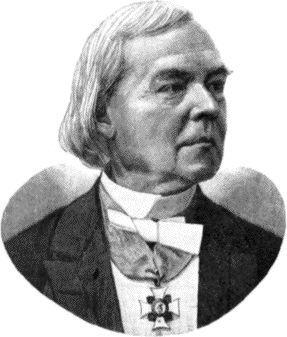Transcription Notes
This text uses utf-8 (unicode) file encoding. If the apostrophes andquotation marks in this paragraph appear as garbage, you may have an incompatible browser or unavailable fonts. First, make sure that the browser’s “character set” or “file encoding” is set to Unicode (UTF-8). You may also need to change your browser’s default font.
In the original book, German was printed in fraktur (“gothic”) typewhile English and other languages were in Roman type. For this e-text,the primary typestyle for each section—fraktur for the central story, Roman elsewhere—is shown in your browser’s regular font. The secondary style—either Roman or fraktur—is shown in sans-serif type.
Notes are identified by their original page number: 8-2, 8-3...Errors, marked E-2, E-3..., are listed at the end of the text.

Emil Frommel
Heath’s Modern Language Series
Eingeschneit
Eine Studentengeschichte
von
Emil Frommel
WITH INTRODUCTION, NOTES AND VOCABULARY
BY
Dr. WILHELM BERNHARDT
BOSTON, U.S.A.
D.C. HEATH & CO., PUBLISHERS
1908
Copyright, 1899
By Wilhelm Bernhardt
The ranks of those illustrious men who a few decades ago, inwar and peace, stood by the side of EmperorWilhelm I.—of glorious memory—have graduallythinned. On the 9th of November, 1896, another of the few thensurviving—Dr. Emil Frommel, Supreme Councillor of thePrussian Consistory, formerly chaplain to the Imperial Court andpastor of the “Garnisonkirche” in Berlin—closed his eyesforever. He was a man whose eminent gifts, both of mind andheart, had been thoroughly tested and fully appreciated not onlyby his personal friend, the old Emperor, but also by the latter’sson, the noble-hearted and much lamented Friedrich, and hisgrandson, Wilhelm II., the present shaper of the destiny of theFatherland. Frommel was a minister of the gospel “by divinegrace,” possessed of a deep and unaffected piety and love formankind, an enrapturing pulpit-orator, a scholar of clear andkeen intellect, a man endowed with the purest nobility of souland intrepid courage, a writer for the masses, in whom the acmeof moral gravity appeared felicitously blended with an alwayspresent and all refreshing humor, a fervent patriot andaccomplished courtier, though far from every courtly flattery andobsequiousness.
Emil Frommel was a native of Southern Germany. Born atKarlsruhe, in the grand-duchy of Baden, on January 5th, 1828, asthe son of the director of the ducal art gallery of that place, he devoted himself to the study oftheology at the universities of Halle, Erlangen, and Heidelberg.In 1850, he was called as vicar to the village of Alt-Lussheim,near Schwetzingen (Baden), whence four years later he went asvicar to Karlsruhe, his native town. In 1864, he followed a callto Barmen, that great industrial center of Westphalia, and againfive years later, he accepted the place as pastor of the“Garnisonkirche” in Berlin. Hardly had he become familiar withhis new s